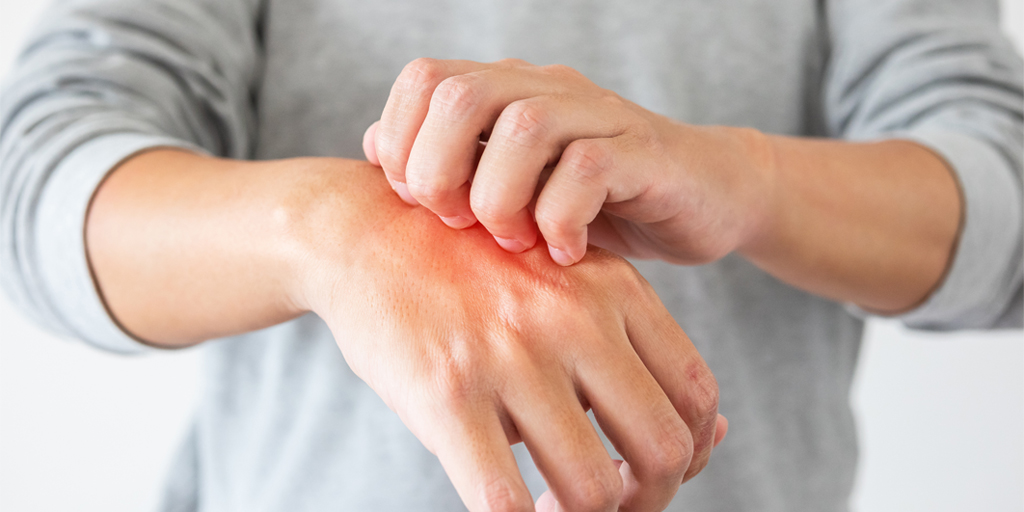Rash vs. Eczema: What’s the Difference?

Discerning whether a skin flare-up is a rash or eczema can be tricky. Eczema and rashes are commonly confused, and for good reason—they look and feel similar. If you are experiencing a red, scaly, itchy or uncomfortable patch of skin and are trying to determine what it is and how to treat it, you are in the right place.
How to Identify Eczema
Eczema is a common skin condition that affects more than 31 million Americans and can appear anywhere on the body. It is normally first noticed as itchy, uncomfortable red patches, although symptoms and severity can vary. The term, “eczema,” encompasses a group of common, and in most cases very manageable, conditions that cause inflamed skin. Each type of eczema has its own triggers and treatment requirements, and some people experience more than one form of eczema.
Eczema symptoms can include:
- Itchy patches of skin
- Changes in skin tone (commonly appearing as redness in lighter skin tones and purple or ashy patches in darker skin tones)
- Raised patches
- Open or “weeping” sores
- Dry, sensitive skin
- Areas of swelling
How to Identify a Rash
Since eczema and rashes exhibit many of the same symptoms, such as being itchy, rashes can be identified through a variety of other considerations. Timing is important in diagnosing a rash, as a possible exposure to an irritant could have caused it. Think over what could have caused it, such as coming in contact with a new food or unusual plant. Rashes can also be caused by tobacco smoke, insect bites, pollen, pet dander, paint, pesticides, hygiene products, wool or other irritants.
The location of your skin irritation can also provide insight into the rash vs. eczema debate. Rashes most commonly appear on the hands, feet, ankles, neck, upper body and limbs. The most common places for eczema to appear are the hands, inside of the elbows, backs of the knees, the face and, in children, the scalp. Keep an eye on the location of your skin irritation, too—if it spreads to another part of the body, it is likely a rash.
How to Treat a Rash
Some rashes respond well to over-the-counter oral antihistamines or hydrocortisone creams. However, rashes can sometimes be indicators of more serious issues that need to be treated by a board-certified dermatologist, or in some cases, warrant a visit to the emergency room. You should seek immediate medical attention if:
- Your whole body is covered by the rash
- Your rash is accompanied by a fever
- Your rash appears suddenly and spreads quickly
- Your rash blisters or turns into open sores
- Your rash is painful
- Your rash is infected as indicated by yellow or green fluid oozing, swelling, crusting, pain, warmth in the rash area or a red streak coming from the rash.
Schedule a consultation to achieve the healthiest skin of your life
Contact UsHow to Treat Eczema
Eczema is a condition that can last for a long time, so it is important to understand which treatments your flare-ups respond to best so you can live as comfortably as possible. Treatment for eczema is also important to minimize the risks for infection or scarring, which can occur as a result of prolonged scratching. For many eczema patients, the basics of treatment and care comes down to managing flares by understanding triggers, having a daily skin care routine and using over the counter or prescription medication as recommended by your board-certified dermatologist. Phototherapy treatments can also minimize flare-ups.
For more information on the best skincare routine for eczema and treatment options for eczema such as topicals, antihistamines, narrowband UVB, DUPIXENT® and immunosuppressants, visit our blog about eczema treatments. You may also be a candidate for clinical research trials for eczema that are conducted by our board-certified dermatologists.
If you are in doubt about whether your skin irritation is a rash or eczema, schedule an appointment at Dermatology Associates of Plymouth Meeting. We will be able to diagnose the issue and hopefully shed light on what may have caused it and your best course of treatment.
